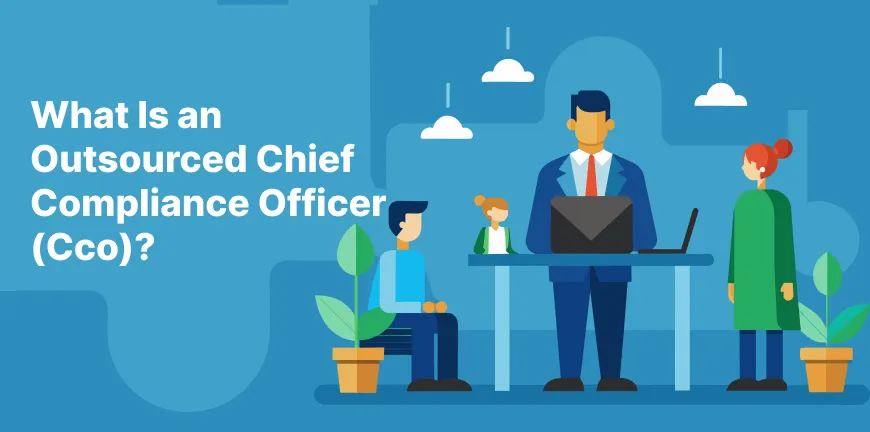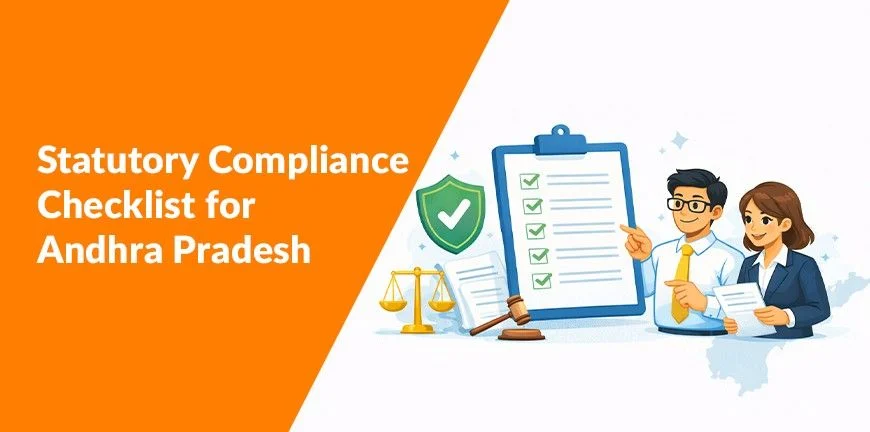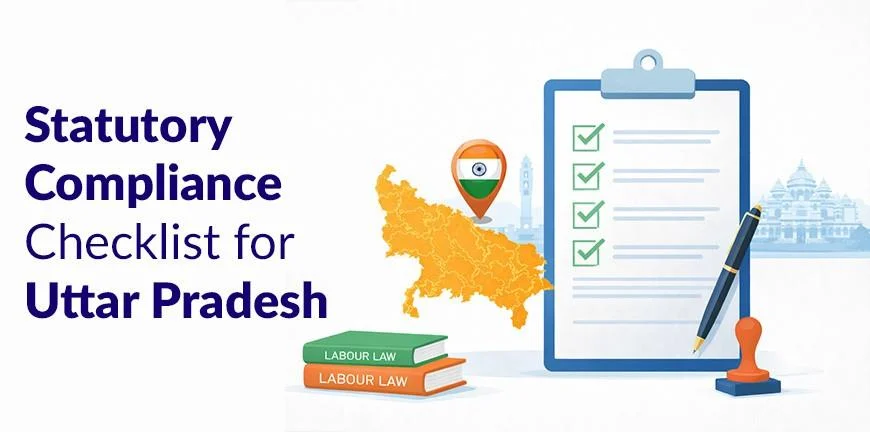
What are Appraisal Letters? Meaning & Definition
27/10/2025
Recruiting for Green and Renewable Tech: What Skills Employers in Clean Tech Are Prioritizing
27/10/2025- What Is an Outsourced Chief Compliance Officer (CCO)?
- Why must Companies Outsource Their Chief Compliance Officer Role?
- What are the Key Responsibilities of an Outsourced CCO?
- What are the Key Benefits of Hiring an Outsourced Chief Compliance Officer?
- How Does an Outsourced CCO Work?
- What are the Differences between Outsourced CCO vs. In-House CCO?
- What are the Common Challenges in Compliance Management?
- How to Choose the Right Outsourced CCO Partner?
- Latest Trends on Compliance Outsourcing in 2025
- Key Takeaways
- FAQs (Frequently Asked Questions)
“Regulatory compliance is critical to managing risk.”: Hendrich Vanlon Smith Jr., CEO of Mayflower-Plymouth
Do you have adequate internal resources to ensure 100% compliance at all times? Don’t you think it’s time to look for an outsourcing CCO partner?
Currently, global data breaches are costing nearly $4.4 million for companies, and around 60 % compliance violations are due to human errors. If companies let errors escalate, they will be destined to lose brand reputation and may have to pay heavy fines and face lawsuits, which disrupt operations and reduce stakeholder trust.
Instead of making a huge investment in developing an internal compliance team, it is always advised to hire an outsourced chief compliance officer who offers expert services at reduced costs. So, who is an outsourced chief compliance officer, and how do they operate?
Let’s gather deep insights that will help companies make the right choice of CCO partner and generate the best outcomes.
What Is an Outsourced Chief Compliance Officer (CCO)?
An Outsourced Chief Compliance Officer, or in short CCO, is an external compliance expert or an agency responsible for overseeing and streamlining a company’s regulatory, legal, & ethical obligations without being a full-time employee. The outsourced chief compliance officer process offers specialized expertise, scalability, & cost efficiency. According to research, companies can save up to 38% costs by hiring an outsourced chief compliance officer instead of managing it in-house.
For example, a mid-sized fintech firm may not be able to afford a full-time CCO permanently, but the regulatory complexity still remains the same regardless of company size, & any mishap can lead to dire consequences like hefty fines, license revocation, etc.
By outsourcing, it can leverage access to seasoned compliance professionals, advanced monitoring tools, & multi-industry insights at a much-reduced cost. An outsourced chief compliance officer ensures continuous compliance management, adapts to regulatory changes in a jiffy, & frees the internal team to devote more time to strategic growth priorities.
Why must Companies Outsource Their Chief Compliance Officer Role?
1. Access to Specialized Expertise
Outsourcing CCO provides access to highly experienced chief compliance officers and their team with deep industry knowledge, regulatory insights, & risk management skills that may not exist internally. The outsourced chief compliance officer process ensures stronger governance, proactive issue detection, & alignment with evolving global compliance standards.
2. Cost Efficiency and Flexibility
Maintaining a full-time CCO can be very expensive. When we compare outsourced CCO vs. In-House CCO, Outsourcing offers a more cost-effective, scalable solution tailored to company size & compliance complexity. This reduces overheads dramatically, while maintaining expert-level compliance coverage & continuous monitoring without long-term commitments.
3. Enhanced Risk Management
The outsourced chief compliance officer deploys structured compliance frameworks, conducts regular audits, & ensures timely reporting. Their independent perspective strengthens risk identification, internal control systems, & regulatory response, minimizing potential fines, legal disputes, and reputational damage.
4. Faster Implementation and Regulatory Adaptability
As we understood from the outsourced chief compliance officer definition, external compliance experts stay ahead of frequent regulatory updates, ensuring quick policy adaptation. Their advanced tools, global network, & proven methodologies accelerate compliance setup. These state-of-the-art solutions reduce time-to-implement & maintain uninterrupted compliance even amid complex regulatory transitions.
5. Objective and Independent Oversight
An outsourced chief compliance officer provides unbiased, third-party oversight, free from internal politics or conflicts of interest. This independence enhances transparency, ethical integrity, & trust among regulators, investors, & stakeholders while reinforcing strong corporate governance practices.
What are the Key Responsibilities of an Outsourced CCO?
The Outsourced CCO provides expert, independent leadership to ensure the company operates legally and ethically, protecting it from regulatory risk and financial penalties.
Here are 6 key responsibilities of an outsourced chief compliance officer.
1. Program Design and Implementation
The outsourced chief compliance officer designs, develops, & establishes a tailored compliance program that fits their client company’s specific regulatory environment (e.g., financial services, healthcare, aviation, bioengineering, etc.).
The outsourced chief compliance officer process involves creating essential documents like the compliance manual, code of conduct, & written supervisory procedures (WSPs), ensuring these foundational documents are comprehensive, clear, & fully operational across the organization from day one.
2. Regulatory Monitoring and Reporting
This involves actively tracking changes & updates to all relevant state, central, & international laws, and regulations. The outsourced chief compliance officer must interpret how these changes impact the firm, deploy necessary policy modifications, & manage the timely submission of all mandatory regulatory filings and disclosures to relevant oversight bodies.
3. Risk Assessment and Mitigation
The outsourced chief compliance officer performs periodic, independent compliance risk assessments across all business units (e.g., trading, marketing, HR, payroll, etc.) to identify potential areas of non-compliance or biases. Based on these findings, they recommend & implement effective internal controls, such as segregation of duties or enhanced transaction monitoring, to proactively manage & reduce identified risks.
4. Training and Communication
The outsourced CCOs are responsible for ensuring that all employees, from new hires to executive leadership, understand their compliance obligations. This includes developing, scheduling, & conducting comprehensive compliance training (both initial and annual refreshers) on topics like anti-money laundering (AML), data privacy, and ethical conduct. This approach ensures attendance records are meticulously maintained.
5. Oversight of Investigations and Audits
When issues arise, the CCO directs & manages internal investigations into potential employee misconduct or breaches of policy, ensuring a fair and documented process. They also coordinate the company’s response to external regulatory examinations and internal audits, including managing document production and implementing all recommended corrective actions.
6. Serving as Regulatory Liaison
The Outsourced CCO acts as the formal, primary point of contact (POC) and representative for the company with all relevant governmental and industry regulators. They are responsible for managing the entire examination process, answering regulatory inquiries, & building a professional, transparent relationship with regulators to maintain the company’s trust and good standing.
What are the Key Benefits of Hiring an Outsourced Chief Compliance Officer?
Here are 5 key outsourced chief compliance officer benefits most companies can enjoy when they partner with a top CCO agency like Alp Consulting:
1. Seamless Multi-Jurisdiction Compliance Management
An outsourced chief compliance officer efficiently manages complex compliance requirements across multiple countries. They ensure consistent standards, documentation accuracy, & adherence to international regulations for organizations operating in diverse legal & geographical environments.
2. Advanced Technology and Compliance Automation
CCOs leverage AI-driven tools, data analytics, & automated reporting systems to streamline compliance tracking, risk assessments, & audit readiness. The outsourced chief compliance officer process boosts accuracy, transparency, & regulatory responsiveness across all business functions.
3. Business Continuity and Reduced Compliance Gaps
As we understood from the outsourced chief compliance officer meaning, CCOs provide uninterrupted compliance coverage even during leadership changes. They ensure continuity, stable governance, and effective mitigation of regulatory risks or operational disruptions.
4. Improved Regulatory Relationships and Audit Preparedness
With extensive experience interacting with regulators, an outsourced chief compliance officer strengthens communication, maintains transparency, and ensures businesses remain audit-ready via continuous documentation, training, & compliance reviews.
5. Focus on Core Business Growth
By outsourcing compliance leadership, organizations can prioritize innovation, operations, & revenue growth while experts manage governance, policy enforcement, and regulatory reporting efficiently in the background.
How Does an Outsourced CCO Work?
Here are 5 ways an outsourced chief compliance officer manages end-to-end compliance for a company:
1. Compliance Assessment and Gap Analysis
The outsourced chief compliance officer begins by evaluating existing compliance frameworks, identifying regulatory gaps, risks, & improvement areas aligned with industry standards and legal obligations.
2. Policy Design and Framework Development
Through a robust outsourced chief compliance officer process, CCOs create customized compliance policies, control frameworks, & governance structures. This ensures alignment with corporate objectives, regulatory mandates, & risk management priorities.
3. Implementation and Training
The outsourced chief compliance officer executes compliance programs, integrates monitoring tools, & conducts employee training to build awareness, accountability, & adherence to legal and ethical standards.
4. Continuous Monitoring and Reporting
The outsourced chief compliance officer performs regular audits, risk reviews, and compliance reporting to detect non-compliance, ensure data integrity, & maintain regulatory readiness.
5. Regulatory Liaison and Strategic Advisory
The outsourced CCO interacts with regulators, provides compliance advice to leadership, & ensures timely policy updates to meet evolving legal requirements.
What are the Differences between Outsourced CCO vs. In-House CCO?
Here are the 8 key differences between Outsourced CCO vs. In-House CCO
| Aspect | Outsourced Chief Compliance Officer (CCO) | In-House Chief Compliance Officer (CCO) |
| 1. Employment Type | An external consultant or firm is hired on a contractual basis. | Full-time internal employee of the organization. |
| 2. Cost Structure | Cost-effective, flexible pricing based on project scope or duration. | Fixed salary, benefits, & long-term overhead costs. |
| 3. Expertise Level | Access to diverse, multi-industry compliance experts & global regulatory knowledge. | Limited to the individual’s experience within specific sectors or company exposure. |
| 4. Scalability | Easily scalable based on business size, needs, & evolving compliance requirements. | Limited scalability: changes require hiring or restructuring. |
| 5. Objectivity | Offers an unbiased, third-party perspective free from internal politics or conflicts of interest. | May face internal pressure, bias, or influence from management decisions. |
| 6. Technology & Tools | Utilizes advanced compliance automation, AI analytics, and monitoring platforms for better efficiency. | Depends on internal budgets and may lack access to the latest compliance technologies. |
| 7. Implementation Speed | Rapid deployment of compliance programs using pre-built frameworks and best practices. | Slower implementation due to internal approvals and limited external benchmarking. |
| 8. Continuity & Risk | Ensures uninterrupted compliance even during leadership or structural changes. | Continuity risks exist if the CCO resigns or transitions unexpectedly. |
What are the Common Challenges in Compliance Management?
Here are 5 common challenges faced by companies in managing compliance throughout the organisation:
1. Constantly Evolving Regulations
Organizations typically struggle to keep up with frequent changes in global, national, & industry-specific regulations, leading to compliance gaps, delayed updates, & potential penalties and lawsuits.
2. Limited Resources and Expertise
Many companies lack trained CCOs, advanced tools, & budgets to manage complex regulatory requirements effectively, increasing risks & operational inefficiencies.
3. Data Privacy and Security Risks
Managing sensitive data under stringent privacy laws like GDPR or DPDP poses major challenges in maintaining secure, compliant, & transparent information handling practices.
4. Inconsistent Policy Implementation
Compliance frameworks often fail due to poor communication, inadequate employee training, & inconsistent enforcement of internal policies across departments & regions.
5. Third-Party and Vendor Compliance
Monitoring vendors, suppliers, & external partners for compliance adherence are next to impossible through internal resources, especially when operating across multiple jurisdictions with varying regulatory standards.
How to Choose the Right Outsourced CCO Partner?
Here are the 5 best ways to make the right choice of CCO outsourcing partner:
1. Evaluate Industry Experience and Regulatory Expertise
Choose a partner like Alp Consulting with proven compliance experience in your industry, strong regulatory knowledge, and a successful track record in handling complex, multi-jurisdictional compliance challenges effectively.
2. Assess Technological Capabilities and Tools
Ensure the outsourcing partner utilises advanced compliance automation, AI-based monitoring, & data analytics tools. This arrangement enhances reporting accuracy, risk detection, & real-time compliance management efficiency.
3. Review Flexibility and Scalability of Services
Select an outsourced chief compliance officer providing agency capable of scaling services as your business grows. The selected partner must be able to adapt quickly to new regulations, organizational changes, & evolving compliance needs.
4. Verify Transparency and Communication Standards
The right partner maintains open communication, provides regular compliance updates, & offers detailed reporting. This ensures trust, accountability, & clarity in every engagement.
5. Check Global Reach and Regulatory Network
Choose a compliance partner with a strong global presence & established relationship with regulatory bodies to navigate cross-border compliance with confidence.
Latest Trends on Compliance Outsourcing in 2025
1. AI-Powered Compliance Automation
Artificial intelligence & machine learning have become the default technology used for streamlining compliance monitoring, automating reporting, & enhancing predictive risk analysis across global organizations.
2. Rise of Fractional Compliance Leadership
Companies increasingly hire part-time or outsourced CCOs to reduce costs while ensuring expert-level compliance oversight & governance continuity.
3. Integrated ESG and Compliance Frameworks
Environmental, Social, and Governance (ESG) reporting is now integrated into compliance programs, aligning sustainability goals with regulatory accountability.
4. Cloud-Based Compliance Management Systems
Organizations are adopting secure, cloud-driven platforms for centralized compliance documentation, real-time monitoring, & multi-location audit readiness.
5. Cross-Border Compliance Expansion
Global businesses are now outsourcing compliance to experts with international regulatory knowledge to navigate complex multi-jurisdictional requirements efficiently.
Key Takeaways
- Outsourced chief compliance officer delivers expert, cost-efficient, and scalable compliance management across multiple industries and jurisdictions.
- Companies save up to 38% costs while ensuring robust governance and continuous regulatory adherence.
- Outsourced compliance officers leverage AI-driven tools and automation for real-time monitoring and risk mitigation.
- Businesses gain independent, unbiased compliance oversight, ensuring transparency, accountability, and ethical operations.
- Partnering with specialized compliance agencies ensures adaptability, regulatory readiness, and sustained business growth.
FAQs (Frequently Asked Questions)
1. What does an outsourced Chief Compliance Officer do?
An outsourced chief compliance officer manages compliance programs, ensures regulatory adherence, conducts audits, mitigates risks, & provides strategic compliance guidance to organizations.
2. Why do companies hire an outsourced CCO?
Companies hire an outsourced chief compliance officer for expert compliance management, cost efficiency, scalability, and unbiased oversight without maintaining full-time executive staff.
3. How much does it cost to outsource a compliance officer?
The costs of outsourcing CCOs vary by industry, scope, and complexity, and typically cost 40–60% less than full-time, in-house executives.
4. What is the difference between an in-house and outsourced CCO?
An outsourced CCO offers flexible, specialized expertise externally, while an in-house CCO works internally on a permanent basis.
5. Is outsourcing a compliance officer suitable for small businesses?
Yes, outsourcing is ideal for small businesses needing expert compliance management without the high costs of full-time staffing.
6. How does an outsourced CCO help in reducing compliance risks?
The outsourced CCO proactively monitors regulations, conducts audits, enforces policies, and ensures timely corrective actions to prevent compliance violations.
7. Can outsourced CCOs handle multiple industries?
Yes, outsourced CCOs possess multi-sector expertise, enabling them to manage diverse regulatory requirements across various industries effectively.
8. What qualifications should an outsourced compliance officer have?
Outsourced CCOs must hold legal or finance degrees, compliance certifications (e.g., CCEP, CAMS), & experience managing multi-jurisdictional regulatory frameworks.
9. How often should compliance audits be conducted?
As per the outsourced chief compliance officer process, audits should be conducted quarterly or biannually, depending on industry regulations, company size, & operational risk levels.
10. Why choose Alp Consulting for outsourced compliance services?
Alp Consulting offers expert compliance leadership, multi-industry experience, cost-effective solutions, advanced technology, & proven regulatory management excellence.

Hariharan Iyer
Hariharan Iyer is the Vice President – Operations at ALP Consulting, bringing over 40+ years of experience in HR outsourcing and labour law compliance. He leads end-to-end HRO operations, ensuring process efficiency, statutory compliance, and seamless service delivery for clients across industries. With a strong background in labour law governance and workforce management, Hariharan plays a key role in driving operational excellence and compliance-led HR solutions at ALP Consulting.




